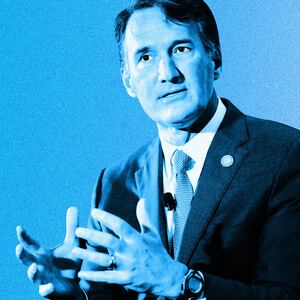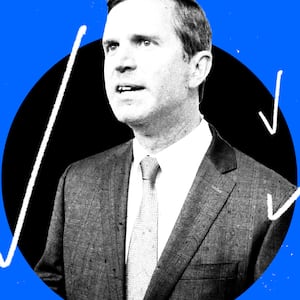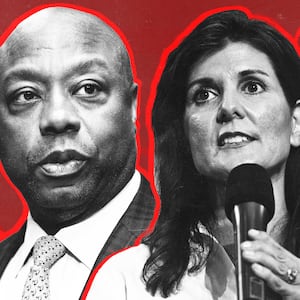Welcome to Trail Mix, a fun but nutritious snack for your election news diet. See something interesting on the trail? Email me at jake.lahut@thedailybeast.com.
This week, we cut through the noise on the Joe Biden reelection angst after a strong election week for Democrats. Plus, we’re on 2024 GOP dropout alert and take a quick trip to school on the first AI election.
Dems’ 2024 paradox
In 2020, Joe Biden rode the electability argument all the way to the White House, convincing his party he was the only Democrat who could defeat Donald Trump.
One year out from the 2024 election, Democrats have put significant electoral wins on the board despite Biden having the lowest approval rating of any post-World War II president heading into a re-election year except for Jimmy Carter in 1979. He trails Trump in most of the battleground states likely to decide the Electoral College.
Voters seem to be saying they like Democratic policies over what the Republicans have to offer—especially on abortion rights, as shown by Tuesday night’s results in Kentucky, Ohio, and Virginia. But when the pollsters come calling, they’re taking out their frustrations on Biden.
That dissonance is fueling enduring fears in the party over Biden’s prospects against Trump—despite the president’s camp insisting that the better reflection of his standing is this week’s state-level Democratic success, not the polls showing his own abysmal approval ratings.
A variety of prominent Democrats told The Daily Beast they’re not worried about the president as their nominee—at least not this far out from next November.
“We’re not electing a pastor or a preacher. We’re electing a president,” Michael Blake, CEO of the Atlas Strategy Group, told The Daily Beast.
Blake, a former Democratic National Committee vice chair who ran Black voter outreach for the Obama 2012 campaign and was one of the former president’s early 2008 hires in Iowa, said he’s skeptical of Biden truly losing support among Black voters.
“I just think we gotta look at things holistically,” he said. “And when the choice is in front of someone next year… I do not believe people will say, ‘You know what? What’s best for us is to go backwards with Trump rather than continuing with Biden.’”
Gabe Esparza, a Democrat running for state treasurer in North Carolina who could become the first Latino candidate ever elected statewide, also isn’t worried. Esparza said he expects Biden to hold strong with the Latino vote, despite movement in the polls and in some of the 2022 midterm results showing Latino men without a college degree moving away from Democrats and toward the GOP.
“I like to look at actual results versus polling opinions, and in this case, I think the results are pretty clear,” Esparza, who was a Biden appointee in the Small Business Association, told The Daily Beast. When Democrats focus on reproductive rights, he argued, they win.
Pro-Biden Democrats may discount the usefulness of polls at this stage, but few would suggest that the president and his team don't need to make any adjustments. The urgent question for them, following Tuesday’s election results, will be how to apply the lessons of victories like Kentucky Gov. Andy Beshear’s to their campaign against Trump, or whoever the GOP nominee is.
New polling suggests Biden has room to grow his popularity by simply associating himself with more popular parts of his agenda.
Evan Roth Smith, the founder of Slingshot Strategies, conducted a recent poll for Blueprint—a new shop “designed to take a sober, hard look at what Democrats need to do in 2024”—and found voters most commonly associate Biden with his pandemic-era policies and student loan forgiveness.
While Blake noted that student loan forgiveness was key to Biden securing the younger Black voters, Roth Smith pointed to several more popular policies Biden could run on besides abortion rights, as well as a seemingly simple tweak on the White House’s economic messaging.
Most voters associate Bidenomics—Bidenworld’s attempt to reclaim an initially pejorative term as an indicator of a strong economy—with creating jobs, the Blueprint poll found, but 64 percent of the voters surveyed said they care the most about lowering the price of goods and services. If Biden can shift that connotation from job growth to lowering prices, he’ll find plenty of running room to boost his numbers, Roth Smith said.
“When Democrats strongly associate themselves with their most popular accomplishments, they do well,” Roth Smith said. “There is plenty of room for the president to be associated with very popular policies that critical voting groups, such as independents, simply aren’t aware of.”
But Biden can’t do anything about another big obstacle to a second term—his age. Some Democratic operatives have privately confided that a Mitch McConnell freeze-type moment would be a potential breaking point for the president, but such a scenario is totally hypothetical.
Earlier in the week, former Obama strategist David Axelrod said publicly what many Democrats have only been willing to say privately. Following the release of more dismal Biden numbers, Axelrod provocatively tweeted that Biden needs to decide if he’s really in good enough shape to be the nominee, “whether it's in HIS best interest or the country’s?”
While Rep. Dean Phillips (D-MN) is offering a primary alternative based on concerns about Biden’s age, his campaign has alienated many Democrats and seems unlikely to pick up the delegates needed to make a viable play for the nomination.
Fundamentally, the agita over Biden’s age at 80—still only three years older than Trump—boils down to whether the president can campaign and adapt to a changing Democratic Party and electorate. But that’s something he’s demonstrated an ability to do in the past, said Georgetown University political science professor Hans Noel.
“Whatever the center of gravity is going in the Democratic party, he gets there pretty fast,” Noel said.
Dropout watch
Once Wednesday night’s simultaneously boring and unhinged repeat of a Trump-free debate wrapped up, Republicans on the campaign trail immediately began turning their attention to the next hottest thing: predicting who’s going to drop out next.
Republican sources in both the anti-Trump and MAGA camps who spoke with The Daily Beast settled on an unexpected consensus in South Carolina Sen. Tim Scott, who just got around to soft-launching his long-rumored girlfriend while taking post-debate photos on the stage.
“I wish it were Vivek [Ramaswamy], but I bet it will be Scott,” a Never Trump Republican and longtime presidential primary campaign adviser told The Daily Beast. “His answer on abortion means he is unelectable.”
After a rocky start to answering basic questions about the GOP’s touchiest issue, Scott stood behind a national ban onstage Tuesday night. “I would certainly as president of the United States have a 15-week national limit,” he said. “We need a 15-week federal limit.” (Notably, Virginia Gov. Glenn Youngkin’s attempt to win the state legislature flopped amid backlash to his campaign promise to enact such a ban.)
The senator also appeared ill at ease on questions of foreign policy, which dominated the debate. At one point, he appeared to endorse the idea of using military force directly on Iran.
Scott has yet to take off in either the early state or national polling. His campaign is far behind the tens of millions in fundraising Trump has raked in and has been spending more than his campaign has raised.
A super PAC supporting Scott also scrapped its fall ad buys, telling donors in a memo obtained by The Washington Post, “we aren’t going to waste our money when the electorate isn’t focused or ready for a Trump alternative.”
While Scott bore the brunt of speculation over an exit, he was at least on the debate stage. There are several other GOP candidates who remain in the race but failed to qualify for Wednesday's event. They face even more pressure to drop out, especially because former Vice President Mike Pence has already suspended his own campaign.
North Dakota Gov. Doug Burgum, for instance, just missed the cut for the Miami debate and faces a vanishing path forward.
“Doug has made clear that voters in Iowa and New Hampshire will determine who moves forward, not pundits and national polls,” a Burgum campaign spokesperson told The Daily Beast. “That’s why he is campaigning in New Hampshire tomorrow and in Iowa starting this weekend.”
And although former Arkansas Gov. Asa Hutchinson is still in the race, the pressure seems to be mounting the most on Scott in the near term. Trump has yet to lay a glove on the senator, but his value for a future Trump administration gig diminishes the longer he stays in, a source close to Trumpworld told The Daily Beast.
“He came into this thing with all the Larry Ellison money, a lot of people saw him as the hope-and-optimism candidate in a potential party without Donald Trump,” said the GOP strategist aligned with Trump. “Nikki Haley is like the 2012 GOP lane, but Scott was seen as this figure who could maybe do more than that. And maybe he would get 18 percent and become a frontrunner for 2028. But instead, he’s blown every opportunity.”
The first AI election
There has yet to be much public opinion research on how voters feel about artificial intelligence in politics, so the University of Chicago’s Ethan Bueno de Mesquita decided to conduct a poll for himself.
In doing so, the political science professor and interim dean at the Harris School of Public Policy wound up with a rare find: substantial bipartisan agreement.
Only 14 percent of respondents to his poll said they have any plans to use AI to get information on the election, but 58 percent said they think the technology will spread misinformation more quickly and amount to “more of a bad thing than a good thing.”
The only area respondents indicated they would trust AI in elections would be to get basic voting resource information, like where and when to vote, via a Chat GPT-type model.
But the professor said such a tool could be useless unless all 3,143 U.S. counties could feed data into the same chat bot, allowing voters to see rules in their specific jurisdiction.
However, Bueno de Mesquita said he sees the initial findings as voters applying a 2016 and 2020 lens to a distinctly new problem.
“They’re worried about it in theory, and the reference point they have in mind is misinformation on social media,” the UChicago dean said.
Instead of increasing the spread of misinformation, which the professor said will simply become cheaper and cheaper as large language models (LLMs) advance—bad news for the Eastern European troll farms—the more consequential threat, he argued, is deepfake videos.
So far, the most prominent political content approaching deepfakes in the United States might be silly memes of Biden, Obama, and Trump playing video games together. But Bueno de Mesquita recalled a recent meeting with tech leaders where they warned watermarking and labeling AI-generated videos won’t address the problem.
Deepfakes have also become far more sophisticated since the 2020 election, already reaching an impact in Turkey’s elections last year, both in the form of an actual deepfake and then the denial of a real video as a deepfake.
“My hypothesis would be that we haven’t had an AI election yet,” Bueno de Mesquita said. And if social media companies want to get ahead of deepfakes, the discourse will ultimately land back at square one, content moderation.
Then, the polarization could follow.
“AI regulation is just content moderation,” the professor said. “I think we’re going to get to polarization, but we’re just not there yet.”
Campaign lit
Wake-up call. The House GOP is finally realizing voters aren’t big fans of their abortion bills, Sam Brodey and Riley Rogerson report from Capitol Hill.
Winning streak. Abortion rights advocates keep winning when the issue is on the ballot, and the post-Dobbs 2024 playbook is becoming clear for Democrats, Grace Panetta and Mel Leonor Barclay report for The 19th.
The Amy & Pete of 2024. In perhaps the only memorable moment from the third GOP debate, Nikki Haley once again let Vivek Ramaswamy know how she really feels about him.
Country roads. The West Virginia senator won’t be seeking reelection, opening the door for a third party 2024 presidential run.
The hardest of soft launches. Tim Scott brought a whole new meaning to the social media euphemism for announcing one’s significant other, bringing his girlfriend on the debate stage. Sophia Cai of Axios was the first to confirm her name with the candidate.










